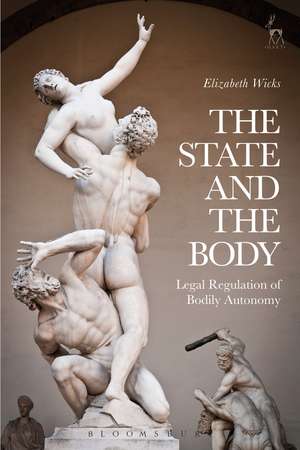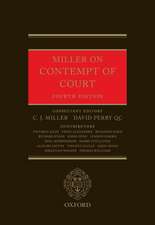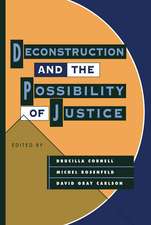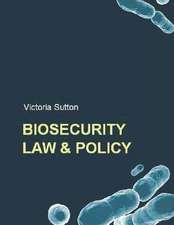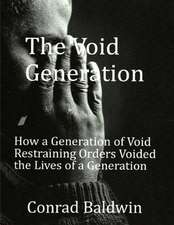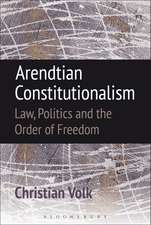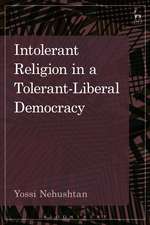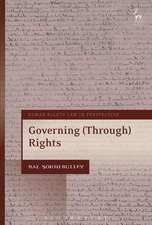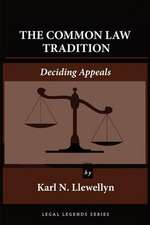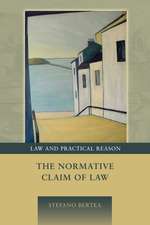The State and the Body: Legal Regulation of Bodily Autonomy
Autor Elizabeth Wicksen Limba Engleză Hardback – 14 dec 2016
| Toate formatele și edițiile | Preț | Express |
|---|---|---|
| Paperback (1) | 235.91 lei 6-8 săpt. | |
| Bloomsbury Publishing – 29 mai 2019 | 235.91 lei 6-8 săpt. | |
| Hardback (1) | 509.12 lei 6-8 săpt. | |
| Bloomsbury Publishing – 14 dec 2016 | 509.12 lei 6-8 săpt. |
Preț: 509.12 lei
Preț vechi: 730.44 lei
-30% Nou
Puncte Express: 764
Preț estimativ în valută:
97.42€ • 104.18$ • 81.23£
97.42€ • 104.18$ • 81.23£
Carte tipărită la comandă
Livrare economică 17 aprilie-01 mai
Preluare comenzi: 021 569.72.76
Specificații
ISBN-13: 9781849467797
ISBN-10: 184946779X
Pagini: 192
Dimensiuni: 156 x 234 x 17 mm
Greutate: 0.43 kg
Editura: Bloomsbury Publishing
Colecția Hart Publishing
Locul publicării:London, United Kingdom
ISBN-10: 184946779X
Pagini: 192
Dimensiuni: 156 x 234 x 17 mm
Greutate: 0.43 kg
Editura: Bloomsbury Publishing
Colecția Hart Publishing
Locul publicării:London, United Kingdom
Caracteristici
This original and topical monograph addresses issues of bodily autonomy, with particular focus on reproductive choices, end of life choices, sexual autonomy, body modifications and selling the body.
Notă biografică
Elizabeth Wicks is a Professor of Human Rights Law at the University of Leicester.
Cuprins
1. Bodily Autonomy I. Introduction: Why the Body Matters II. Autonomy: Rights and Relations III. The Body IV. Conclusion 2. The Public-Private Distinction I. Introduction II. Different Meanings of Public and Private: Contexts, History and Rights III. Feminist Critique of the Public-Private Distinction IV. A Descriptive/Normative Spectrum V. Defining the 'Private' VI. Defining the 'Public' VII. Conclusion 3. Reproductive Choices I. Introduction II. Reproduction, the Public-Private Distinction and the Right to Respect for Private Life III. State Regulation of Reproduction in England and Wales IV. Justification for State Regulation of Reproduction V. Conclusion 4. Choices about DyingI. Introduction II. State Regulation of Dying in England and WalesIII. Justifications for the Regulation of Dying IV. Conclusion 5. Sexual Autonomy I. Introduction II. Regulation of Sexual Autonomy III. Public Morality and (Private) Sexual Autonomy IV. Conclusion 6. Bodily Modification I. Introduction II. Cosmetic Surgery III. Female Genital Mutilation IV. Body Integrity Identity Disorder and the Amputation of Healthy Limbs V. Gender Reassignment Surgery VI. Paternalistic Restrictions on Body Modification VII. Conclusion 7. Selling the Body I. Introduction II. Prostitution III. Surrogacy IV. Sale of Eggs or Organs V. Preserving the Choice Paradigm VI. Conclusion 8. Conclusion: Legitimate Justifications for Legal Regulation of Bodily AutonomyI. Defining Bodily Autonomy II. Embracing the Harm Principle III. Rejecting Paternalism and Moralism IV. Preserving the Dignity of the Human Species V. Defending the Choice Paradigm VI. Practical Recommendations to Enhance and Support Bodily Autonomy
Recenzii
This is indeed a thought-provoking book that continues an important debate about the dichotomy of privacy and paternalism, autonomy and regulation, harm and protection and the body and the mind. This book is likely to appeal to legal scholars, philosophers and bioethicists alike. It is well written and easy to read with a logical flow to the arguments.
[T]his book provides thought-provoking discussions on state intervention in bodily choices ... Her writing style is straightforward and easy to read, and she explains the legal background of each category of bodily choices that she discusses well. This book contains academic discussion from a range of sources, which makes it a good foundation for further research and discussion about state intervention into private choices about the body.
[T]his book provides thought-provoking discussions on state intervention in bodily choices ... Her writing style is straightforward and easy to read, and she explains the legal background of each category of bodily choices that she discusses well. This book contains academic discussion from a range of sources, which makes it a good foundation for further research and discussion about state intervention into private choices about the body.
